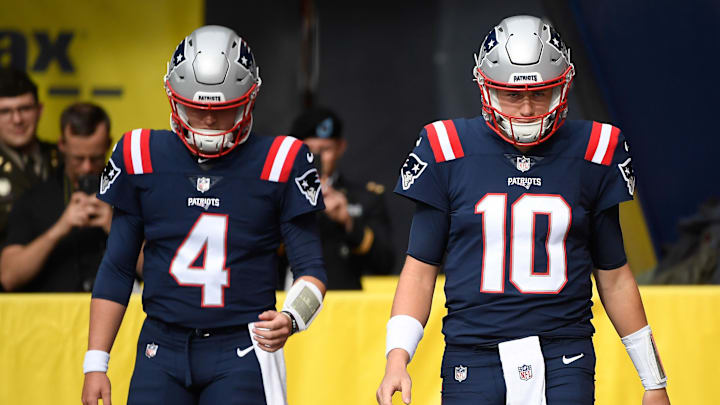Mac Jones waited for his turn at Alabama and made the most of it. He led the Crimson Tide to an undefeated season, a National Championship and won the Heisman Trophy. That led to Jones being selected 15th overall by the New England Patriots.
In his rookie year, Jones led a rebuilding Patriots team to an unexpected playoff appearance and was selected to the NFL all-rookie team and the Pro Bowl.
What happened next is still incomprehensible.
In 2023, when Jones was expected to blossom, he wilted. Eventually, the mental mistakes were too much, and Jones was benched and didn’t play another snap for New England.
Some blame can be on the Patriots and how they failed to develop Jones, but it ultimately falls on Jones. He was the one making poor judgments and ill-advised throws. Jones’ collapse falls on his shoulders because he broke down when the going got tough.
Now the Patriots are rebuilding again, probably with a new franchise quarterback being selected with the third overall pick. If not, at least two could sneak into the first round or be on the board for New England’s second-round selection.
Arm strength, mobility, football IQ, and character will be measured to determine whether these prospects would fit within the Patriots' organization. These players will be scrutinized thoroughly. These evaluations wouldn’t be complete if New England didn’t consider how these individuals handled adversity.
The New England Patriots misjudged Mac Jones’ ability to handle adversity. The Patriots better not make the same mistake twice
Sports Illustrated’s Albert Breer made a few accusations about Jones in a recent article detailing why the Patriots moved on from Bill Belichick. Breer said Jones entered the 2023 season with a “false bravado” that rubbed the coaching staff and his teammates wrong. Jones was eventually benched because Belichick was tired of “Jones’ attitude and lack of leadership qualities for the position.”
If that was going on behind the scenes, on the field, Jones was pressing. He was trying to win games with every pass instead of playing for the next down or next series. I grew tired of the repeated mistakes and declared I was done with Jones.
Bailey Zappe wasn’t much better in place of Jones, but he bounced back better than Jones did in his small sample size. He went from being cut after training camp to playing smarter as the starter.
Zappe even bounced back from turning the ball over four times in the first half against the Buffalo Bills to get the Patriots within a score of pulling off an upset.
It takes a lot of mental toughness to recover like that. That’s because Zappe built up that resilience. Not only did Zappe have to earn the Patriots’ trust, but before that Zappe didn’t get any DI offers. Had to play at Houston Baptist before transferring to Western Kentucky for his senior season.
What about Jones? He attended the Bolles School, a prep school powerhouse in Florida, winning a state championship a year after being the runner-up. From there, Jones signed with Alabama. When it was finally his turn, he was surrounded by NFL talent. The biggest deficit Jones faced that season was seven points against Ole Miss and Georgia.
Maybe Jones’ rookie season was too good, as he didn’t deal with the growing pains many rookie quarterbacks must endure. He seemed to be able to overcome less-than-ideal circumstances in his second year, especially since he finished strong. But that came crashing to an end in year three.
With the Patriots about to rebuild with a new franchise signal caller, New England mustn’t repeat the same mistakes. To ensure his success, there should be a better infrastructure around the quarterback. The coaching staff needs to build the offense around the quarterback’s strengths and weaknesses, not overwhelm him in his first year.
But before molding a franchise QB, the Patriots have to pick the right lump of clay. The best one might not be flawless, but it is one that is held up through some storms.
Up to six quarterbacks could be selected in the first two rounds. Some will wow the scouts with their cannon arm, athleticism, and high Wonderlic score. But maybe the most impressive thing about these prospects is their ability to bounce back.
Washington’s Michael Penix Jr.’s performance in the national semifinal win over Texas caught the nation's attention. But his biggest flaw could be his biggest accomplishment. Penix Jr. recovered from four season-ending injuries to play two seasons for the Huskies should be worth something to talent evaluators.
Michigan’s JJ McCarthy took the disappointment of a semifinal loss to TCU in 2022 and used it to fuel the Wolverines’ 2023 campaign. The storybook ending wouldn’t have happened without McCarthy leading the Wolverines on a fourth-quarter game-tying touchdown drive to force overtime.
Should a lack of adversity disqualify a prospect? No. North Carolina’s Drake Maye had two turbulence-free years as a Tar Heel. The biggest challenge Oregon’s Bo Nix and LSU’s Jayden Daniels faced might have been choosing a school after entering the transfer portal. And if Caleb Williams’ humbling 2023 season after a Heisman campaign is the worst he ever dealt with, then so be it.
But so often, the intangibles determine one’s success or failure. Sometimes, failing is the best thing to happen to a player. In part, Michael Jordan became Michael Jordan because initially, he didn’t make the cut for his high school’s basketball team.
Any of the top QB prospects this year have the physical tools to be successful. But what can’t be measured will factor into whether they have what it takes to lead the Patriots through a rebuild and back to relevance.
Whoever triumphed over adversity could be better equipped to handle a rebuild. It’s not a deciding factor, but it should be taken into consideration.
